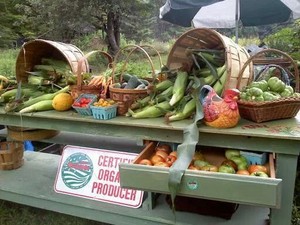29 Jan Sun 2012
Catie & the Weasel
There was quite a stir when I went to the hen house the oher day all the chicks and the cowardly rooster named Earle were all up on the rafters and there were 2 dead chickens laying oin the barn floor.I looked everywhere and couldn't find anything out of the ordinary .So I took the dead chickens and thought maybe because it had been so cold .I went out to feed the chicks a snack at mid day two more dead.Now I was hot mad and was determined to find out what was killing my chickens .Soooo I got my 22 rifle and a pocket full of bullets and sat in the hen house for a good hour.Finally just as I was ready to leave there he was the ugliest little weasel you ever saw. I aimed my gun missed.Then the weasel started coming towards me and the chickens I struggled to get a second bullet in the gun I was shaking so hard I couldn't do it !! what seemed like an hour was actually a minute I got the bullet in and I fired I knicked him, he spun around and left as fast as he could. I was very shaken by the whole experience as I really don't like to kill anything.I called my brother and said " Jim do you think he will be back ..He replied " Would you ? " haha
Be careful of the weasel he is a sneaky little good for nothing varmit. That's the latest from the farm except that we are in love ...to be cont ......
Catie
04:29 PM EST
15 Jan Sat 2011
ORGANIC MATTERS........
Organic Food is Pure Food, Free of Chemical Additives
- Organic food doesn't contain food additives, flavor enhancers (like MSG), artificial sweeteners (like aspartame and high-fructose corn syrup), contaminants (like mercury) or preservatives (like sodium nitrate), that can cause health problems.
- Eating organic has the potential to lower the incidence of autism, learning disorders, diabetes, cancer, coronary heart disease, allergies, osteoporosis, migraines, dementia, and hyperactivity.
Organic Food Is Safer
- Organic food doesn't contain pesticides. More than 400 chemical pesticides are routinely used in conventional farming and residues remain on non-organic food even after washing. Children are especially vulnerable to pesticide exposure. One class of pesticides, endocrine disruptors, may be responsible for early puberty and breast cancer. Pesticides are linked to asthma and cancer.
- Organic food isn't genetically modified. Under organic standards, genetically modified (GM) crops and ingredients are prohibited.
- Organic animals aren't given drugs. Organic farming standards prohibit the use of antibiotics, growth hormones and genetically modified vaccines in farm animals. Hormone-laced beef and dairy consumption is correlated with increased rates of breast, testis and prostate cancers.
- Organic animals aren't fed slaughterhouse waste, blood, or manure. Eating organic reduces the risks of CJD, the human version of mad cow disease, as well as Alzheimer's.
- Organic animals aren't fed arsenic.
- Organic animals aren't fed byproducts of corn ethanol production (which increases the rate of E. coli contamination).
- Organic crops aren't fertilized with toxic sewage sludge or coal waste, or irrigated with E. coli contaminated sewage water.
- Organic food isn't irradiated. Cats fed a diet of irradiated food got multiple sclerosis within 3-4 months.
- Organic food contains less illness-inducing bacteria. Organic chicken is free of salmonella and has a reduced incidence of campylobacter.
- Organic dairy has environmental benefits: Shades of Green: Quantifying the Benefits of Organic Dairy Production
Catie
04:49 PM EST

